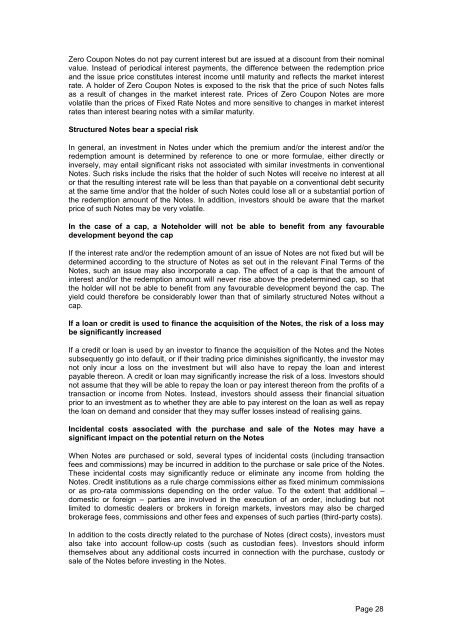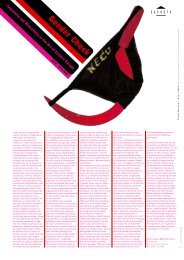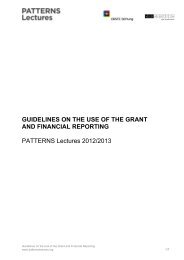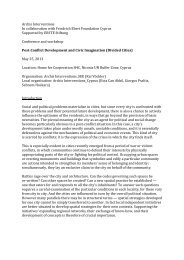DIE ERSTE österreichische Spar-Casse ... - ERSTE Stiftung
DIE ERSTE österreichische Spar-Casse ... - ERSTE Stiftung
DIE ERSTE österreichische Spar-Casse ... - ERSTE Stiftung
You also want an ePaper? Increase the reach of your titles
YUMPU automatically turns print PDFs into web optimized ePapers that Google loves.
Zero Coupon Notes do not pay current interest but are issued at a discount from their nominal<br />
value. Instead of periodical interest payments, the difference between the redemption price<br />
and the issue price constitutes interest income until maturity and reflects the market interest<br />
rate. A holder of Zero Coupon Notes is exposed to the risk that the price of such Notes falls<br />
as a result of changes in the market interest rate. Prices of Zero Coupon Notes are more<br />
volatile than the prices of Fixed Rate Notes and more sensitive to changes in market interest<br />
rates than interest bearing notes with a similar maturity.<br />
Structured Notes bear a special risk<br />
In general, an investment in Notes under which the premium and/or the interest and/or the<br />
redemption amount is determined by reference to one or more formulae, either directly or<br />
inversely, may entail significant risks not associated with similar investments in conventional<br />
Notes. Such risks include the risks that the holder of such Notes will receive no interest at all<br />
or that the resulting interest rate will be less than that payable on a conventional debt security<br />
at the same time and/or that the holder of such Notes could lose all or a substantial portion of<br />
the redemption amount of the Notes. In addition, investors should be aware that the market<br />
price of such Notes may be very volatile.<br />
In the case of a cap, a Noteholder will not be able to benefit from any favourable<br />
development beyond the cap<br />
If the interest rate and/or the redemption amount of an issue of Notes are not fixed but will be<br />
determined according to the structure of Notes as set out in the relevant Final Terms of the<br />
Notes, such an issue may also incorporate a cap. The effect of a cap is that the amount of<br />
interest and/or the redemption amount will never rise above the predetermined cap, so that<br />
the holder will not be able to benefit from any favourable development beyond the cap. The<br />
yield could therefore be considerably lower than that of similarly structured Notes without a<br />
cap.<br />
If a loan or credit is used to finance the acquisition of the Notes, the risk of a loss may<br />
be significantly increased<br />
If a credit or loan is used by an investor to finance the acquisition of the Notes and the Notes<br />
subsequently go into default, or if their trading price diminishes significantly, the investor may<br />
not only incur a loss on the investment but will also have to repay the loan and interest<br />
payable thereon. A credit or loan may significantly increase the risk of a loss. Investors should<br />
not assume that they will be able to repay the loan or pay interest thereon from the profits of a<br />
transaction or income from Notes. Instead, investors should assess their financial situation<br />
prior to an investment as to whether they are able to pay interest on the loan as well as repay<br />
the loan on demand and consider that they may suffer losses instead of realising gains.<br />
Incidental costs associated with the purchase and sale of the Notes may have a<br />
significant impact on the potential return on the Notes<br />
When Notes are purchased or sold, several types of incidental costs (including transaction<br />
fees and commissions) may be incurred in addition to the purchase or sale price of the Notes.<br />
These incidental costs may significantly reduce or eliminate any income from holding the<br />
Notes. Credit institutions as a rule charge commissions either as fixed minimum commissions<br />
or as pro-rata commissions depending on the order value. To the extent that additional –<br />
domestic or foreign – parties are involved in the execution of an order, including but not<br />
limited to domestic dealers or brokers in foreign markets, investors may also be charged<br />
brokerage fees, commissions and other fees and expenses of such parties (third-party costs).<br />
In addition to the costs directly related to the purchase of Notes (direct costs), investors must<br />
also take into account follow-up costs (such as custodian fees). Investors should inform<br />
themselves about any additional costs incurred in connection with the purchase, custody or<br />
sale of the Notes before investing in the Notes.<br />
Page 28










